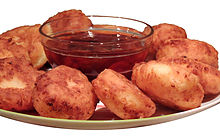Syrniki
 Syrniki served with strawberry varenye | |
| Alternative names | Syrnyky, tvorozhniki |
|---|---|
| Type | Pancake |
| Associated national cuisine | Belarusian, Polish, Russian, Serbian, Ukrainian |
| Main ingredients | Quark (curd cheese), flour, eggs, sugar; sometimes raisins, vanilla extract |
Syrniki (Belarusian: сырнікі; Russian: сырники) or syrnyky (Ukrainian: сирники)[1] are fried Eastern Slavic quark (curd cheese) pancakes. In Russia, they are also known as tvorozhniki (творо́жники). They are a part of Belarusian, Russian, Ukrainian, Latvian (sirņiki)[2] and Serbian cuisine. Their simplicity and delicious taste have made them very popular in Eastern Europe.
Etymology[]
The name syrniki is derived from the Slavic word syr (сыр), stand for soft curd cheese.[3][4] The Ukrainian language retains the old Slavic sense of the word, as in domashnii syr (домашній сир, literal translation 'domestic cheese'), whereas in Russian, another old Slavic word for curd cheese, namely the word tvorog (творог), is used.
Preparation[]

Syrnyky or tvorozhniki are made from creamy quark, mixed with flour, eggs and sugar, sometimes adding vanilla extract.[5] Pot cheese or farmer's cheese is suggested as a substitute for the tvorog.[5] The soft mixture is shaped into cakes, which are pan- or shallow-fried in vegetable oil[6] or in hot butter.[7] The consistency should remain slightly creamy,[8] while they are slightly browned on both sides.[9] They are traditionally sweet[7] and served for breakfast or dessert,[10] but can be made savory as well.[5] Raisins, chopped dried apricot, fresh apples or pears are sometimes added into the batter.[11] They are typically served with varenye, jam, smetana (sour cream) and / or melted butter.[5][6][12]
See also[]
- Quarkkäulchen
- Lazy varenyky
- Oladyi
References[]
- ^ Ekaterina, Bylinka (November 2011). Home cooking from Russia : a collection of traditional, yet contemporary recipes. Bylinka, Liudmila. Bloomington, Indiana. p. 100. ISBN 9781467041362. OCLC 931920756.
- ^ "Latgalian recipes: "Sirņiki"". Public Broadcasting of Latvia. 19 August 2019. Retrieved 31 August 2019.
an Eastern Slavic traditional dish which long ago crossed the border from Belarus into Latgale to become part of the local cuisine.
- ^ Aslanov, Cyril (1999), "La réflexion linguistique hébraïque dans l'horizon intellectuel de l'occident médiéval Essai de comparaison des traités de grammaire hébraïque et provençale", Bulletin de la Société de Linguistique de Paris, 94: 28, doi:10.2143/BSL.94.1.2002470, citing K. B. Baburina (97, 3, 48– 52)
- ^ Kess, Inga Инга Кесс (2005). "The origin of words. Names of common dishes and individual products" Происхождение слов. Названия распространенных блюд и отдельных продуктов. Archived from the original on 2008-12-08.
- ^ a b c d Mendelson, Anne (2008), Milk: The Surprising Story of Milk Through the Ages, Alfred A. Knopf, pp. 307–308, ISBN 9781400044108
- ^ a b
Lyakhovskaya, L. (Ляховская, Л ) (1996), Pravoslavnaya obryadovaya kukhnya Православная обрядовая кухня [Orthodox ritual kitchen], Leyla Лейла, p. 606,
Подавать сырники горячими со сметаной, вареньем, джемом к чаю, молоку, соку (Serve cakes hot with sour cream, varenye, jam and tea, milk, juice.)
- ^ a b Sacharow, Alla (1993), Classic Russian Cuisine: A Magnificent Selection of More Than 400 Traditional Recipes, Alfred A. Knopf, p. 281, ISBN 9781628720792 ISBN 1-55970-174-9
- ^ Jones, Catherine Cheremeteff (2013), A Year Of Russian Feasts, Random House, p. 82, ISBN 9781446488782
- ^ Schecter, Jerrold L.; Schecter, Leona P. (1988), Back in the U.S.S.R.: An American Family Returns to Moscow, Scribner, p. 14, ISBN 9780684189963
- ^ Henry, Diana (2016), Roast Figs, Sugar Snow: Food to Warm the Soul, Octopus Books, p. 50, ISBN 9781784723316 ISBN 1784723312
- ^ Ion, Larisa (2017-05-18). "Syrniki - traditional Russian and Ukrainian cottage cheese pancakes". RedNumberONE. Retrieved 2019-10-06.
- ^ "Mamushka: Recipes from Ukraine and Eastern Europe".
External links[]
| Wikibooks Cookbook has a recipe/module on |
- Belarusian desserts
- Russian desserts
- Cheese dishes
- Desserts
- Pancakes
- Ukrainian desserts